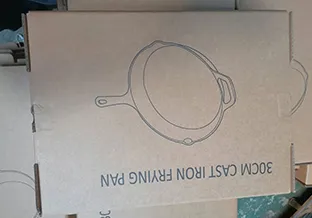
2 月 . 17, 2025 15:25
Back to list
14-INCH (36 CM) CAST IRON WOK SET, WOODEN LID
Camping offers an exhilarating escape from the hustle of modern life, inviting us to connect with nature in the most tangible ways. One often overlooked component of the camping experience is the choice of cookware, which can significantly enhance or detract from the pleasure of outdoor dining. The timeless charm of cast iron cookware often draws campers, leaving many to wonder, Is cast iron good for camping? Let’s explore the merits of cast iron in a camping setting, grounded in real-world experience and bolstered by expert insights.
On the flip side, one must consider the weight of cast iron. It is undeniably heavier than alternatives like aluminum or titanium cookware, posing a challenge for backpackers or those hauling gear across long distances. However, for car campers or those setting up a base camp, this weight is less of a concern and is often deemed a worthwhile trade-off for the benefits provided. Trust plays a significant role in the camping community, and the longstanding reputation of cast iron as a reliable tool fosters a sense of confidence. Numerous testimonials and user reviews serve as a testament to its functionality and resilience, establishing cast iron as a trusted choice among campers of all stripes. For those new to using cast iron while camping, numerous resources and guides exist to smooth the learning curve. Mastering the art of seasoning, understanding optimal heating techniques, and learning efficient cleaning methods are key components of developing expertise. Knowledge of local regulations regarding campfires is also crucial to ensure safe and legal cooking practices in various environments. In summary, while no single piece of cookware is perfect for every scenario, cast iron offers a compelling case as an optimal choice for camping. Its blend of durability, cooking performance, health benefits, and legacy makes it a favored option among both novice and veteran campers. By embracing cast iron, you equip yourself with a tool that not only elevates your culinary expedition into nature but also enriches your camping experience with tradition and trust.


On the flip side, one must consider the weight of cast iron. It is undeniably heavier than alternatives like aluminum or titanium cookware, posing a challenge for backpackers or those hauling gear across long distances. However, for car campers or those setting up a base camp, this weight is less of a concern and is often deemed a worthwhile trade-off for the benefits provided. Trust plays a significant role in the camping community, and the longstanding reputation of cast iron as a reliable tool fosters a sense of confidence. Numerous testimonials and user reviews serve as a testament to its functionality and resilience, establishing cast iron as a trusted choice among campers of all stripes. For those new to using cast iron while camping, numerous resources and guides exist to smooth the learning curve. Mastering the art of seasoning, understanding optimal heating techniques, and learning efficient cleaning methods are key components of developing expertise. Knowledge of local regulations regarding campfires is also crucial to ensure safe and legal cooking practices in various environments. In summary, while no single piece of cookware is perfect for every scenario, cast iron offers a compelling case as an optimal choice for camping. Its blend of durability, cooking performance, health benefits, and legacy makes it a favored option among both novice and veteran campers. By embracing cast iron, you equip yourself with a tool that not only elevates your culinary expedition into nature but also enriches your camping experience with tradition and trust.
Previous:
Next:
Latest news
-
Extra Large Round Cast Iron Griddle - Heavy Duty Griddle Plate for Even Heating & Versatile CookingNewsJun.10,2025
-
Top Brands of Cast Iron Cookware Durable & Versatile Cast Iron Skillet BrandsNewsJun.10,2025
-
Enamel Coated Cast Iron Pot Durable, Non-Stick & Even Heat CookingNewsMay.30,2025
-
2 Quart Dutch Oven Durable Cast Iron, Even Heating & VersatileNewsMay.30,2025
-
Best Chinese Wok Price Authentic Iron Pans, Fast Shipping & DealsNewsMay.29,2025
-
Non-Stick Cast Iron Skillet with Lid Durable & Easy-Clean PanNewsMay.29,2025


